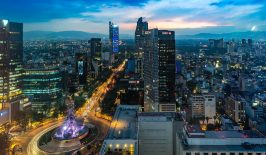Trees can benefit the environment in a vast number of ways. Not only do they turn carbon dioxide into oxygen – thus providing the basis of the environment which sustains all life on Earth – but they can also scrub clean the air of pollutants and dangerous toxins. Due to this, they are often used by urban planners to reduce air and noise pollution, as well as beautify areas.
However, when it comes to their role as pollution-fighters in cities, trees also have some downsides. Firstly, they take a long time to grow, and secondly, dense urban areas are also not ideal for planting large numbers of trees – and it is often these areas that are most in need of pollution reduction.
That’s why a Mexican startup, BiomiTech, has created artificial ‘robot’ trees which can do the work of an entire small forest. The trees, which use organic algae to replicate the processes of natural trees could be one way of improving air quality in areas lacking in green spaces.
A single artificial tree, dubbed the BioUrban 2.0 by the company, is 4.2 meters tall and around 3 metres across at its widest point. Within its modernist exterior and concentric steel bands is a special microalgae developed by BiomiTech. After polluted air has entered into the BioUrban, the algae gets to work, using natural processes to scrub the air of pollutants and release pure oxygen. Jaime Ferrer, a founding partner in BiomiTech, explained:
“What this system does, through technology, is inhale air pollution and use biology to carry out the natural process (of photosynthesis), just like a tree.”
The company claims that a single BioUrban 2.0 could do the work of around 368 real trees – pumping out 2,890 clean breathfuls of air a day.
Pollution in Mexico City
Mexico is certainly no stranger to air pollution. On average, Mexico City often has a suspended air pollutant density twice the World Health Organization’s maximum recommended amount. It is not unheard of in Mexico City for schools to be closed, and people urged to stay indoors, due to the levels of pollution in the city.
The vast majority of this pollution comes from the city’s estimated 3 million cars. The dense urban nature of the city also means it is often difficult to create meaningfully sized parks in certain areas. It is BiomiTech’s goal to provide viable solutions for these locations, and to reduce air pollution in certain targeted areas, such as around schools, hospitals and homes for the elderly, as well as places frequented by pedestrians.
Currently, BiomiTech has installed three BioUrban trees across Central and South America. One has been ‘planted’ in Puebla, Mexico – the home of BiomiTech, while two more have been sent to Colombia and Peru. Turkey has recently put in an order for two BioUrbans, while Mexico City and Monterrey in northern Mexico are also eyeing up the project.
For its part, Mexico City has previously employed similar technology to reduce car pollution – such as installing vertical gardens on highway support columns.
Despite the claims of efficiency of the BioUrban, Ferrier is also eager to insist BiomiTech isn’t out to replace trees in urban areas, only to provide solutions to areas where planting trees is not viable. As he told the AFP:
“They can be used in high-traffic areas, transportation terminals, where you can’t just plant a hectare of trees. The system isn’t going to end air pollution in Mexico City. But it can alleviate the problem in high-traffic areas.”
Furthermore, with an individual price tag of around 50,000 USD per BioUrban, traditional trees might still be a cheaper – albeit more long term – alternative for some locations. Additionally, BiomiTech produces smaller models of the BioUrban suited for use indoors, such as in smokey bars and clubs.
However, this isn’t the first time we’ve seen technology teaming up with microorganisms to help reduce urban pollution. The City Tree, a vertical moss garden has also been springing up around Europe as a means to increase air quality, as well as provide WiFi and e-bike charging infrastructure.






